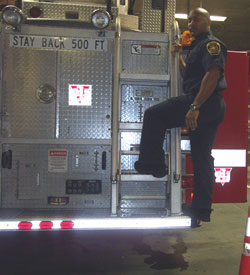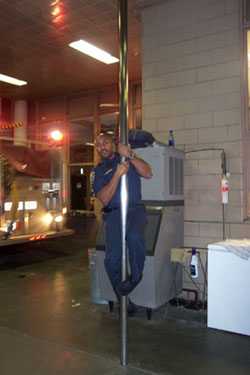Imagine being in a deep slumber, unconscious to the world, incognizant of the things that are going on around you. The only thing that will wake you is the sound of the loud siren that goes off. You are up! An announcement is made telling you where you need to be. You suit up, throw on your boots, and jump through a hole in the floor sliding down a metal pole. Your chariot waits. You find your spot and jump in for the ride, a ride that could be the last one of your life. Your adrenaline is pumping, your heart is jumping and in your mind, you don’t have a clue what dangers are immediately facing you. Will you return with all of your crew, or will you be missing one or two? Is it possible that one of the missing will be you? You wipe that thought out of your mind with the faith that God will be with you.
The truck pulls out of the garage and begins its journey. Your crew is racing through the city streets and the driver is being careful not to cause an accident or injury to pedestrians. You arrive at your destination. There is a yellowish glow visible though several windows of a building accompanied by black smoke. You gave your promise to protect and serve. You can’t back out now.
Standing at a stout 5’2”, two years divorced and former military man, Ted Maxberry born and raised in Cincinnati, OH, is a firefighter for the city fire department. When he is not on duty, you can find Ted at a rink just about any day of the week. Ted does not roll at just one rink. Do not be surprised if you find him in Dayton, Columbus, or even as far as Detroit. Each city has its own unique style and although Ted is from Cincinnati, the style he has grown (not vertically of course) to love is the Michigan style. Over the years he has networked with the Michigan skate family and learned to get down to the Motown sound. He has perfected his open house so well that when he is not putting out fires on the city streets, he is starting them at the rink with his Fomac wheels.
MBR: Being a skater, I’m sure you have found ways to take time off so you can skate. How does your rotation schedule work for you?
Maxberry: My work schedule is 24 hours on duty and 48 hours off. Then every three weeks, we get 5 days off. But when I want take a day off or vacation day, I’m off for a total of 5 days because of the 1 day on and 2 days off. If you think about it working 2 days a week is 48 hours so to compensate for that extra 8 hours per week, we get one 24 hour day off (once every three weeks) which is called a Kelly Day named after the guy who came up with the concept, at least that is the rumor.MBR: Describe a typical 24-hour period at work.
Maxberry: Contrary to popular belief we don’t get a lot of sleep. At 7:00 a.m. I come in and put my gear on the truck that I’m assigned to for the day. It’s called “putting your gear on track”. So if a fire is called, we are ready to go. At 8:00 we drill (train) and go over everything that is pertinent to our job. At 9:00 a.m. we do our house duties, cleaning, garbage disposal etc. At 10:00 a.m. we do inspections. We inspect buildings or fire hydrants, particularly in the winter making sure there is no water in them to freeze up and block the flow. At 10:45 a.m. we go grocery shopping. By 12:00 we are eating. We do not go out to eat. WE COOK! Fire department cooking is probably some of the best cooking you will ever eat. This is because if you put together a bad meal, they will talk about you forever. Peer pressure. As a matter of fact, there is peer pressure on everything we do.
After 12, the day is pretty much ours until about dinnertime, around 6 or 7 p.m. You can take a nap or do whatever you want to do. After dinner, we clean again, mop the floors and all the other house duties. The kitchen and dining area must be immaculate. Later we might have a street drill where we make sure everyone knows were the streets are in the city. Then we are doing our own thing again, the rest of the day is pretty much totally ours. Now this sounds easy but you have to remember that we get interrupted a lot. That’s our job. Officially, we lay down at 10:00 p.m. but in reality, we lay down whenever we are tried, since we never know what the night is going to bring. You have to make sure you are rested when and if that bell rings.
MBR: What kind of education or training does it take to become a Fire Fighter?
Maxberry: We had to go to fire school, which was 16 weeks when I took it but it’s longer than that now. Different cities have different requirements. We learn everything it takes to put out a fire and we get our medical training there too. A part of fire training requires going into the high intensity “burn buildings”, setting a controlled fire and learning how to put it out. That’s when you learn if this is the job for you. There have been people who quit because they are afraid of heights when it comes to climbing ladders and then others quit because they are claustrophobic. They can’t handle having on the mask (face piece) and feeling closed in. As for the medical training, some of the things we learn are how to control bleeding and dealing with contagious diseases. That accounts for most of it. It is referred to as EMT Training (Emergency Medical Training).
Actually about 80% of our calls are medical and only 20% are fires. For medical emergencies, we are the ambulance service as well. When 911 is called the fire department goes out to determine if the person requires an ambulance. We have to do this for car accidents, people assaulted, people dying of AIDS, and people suffering from tuberculosis and other illnesses. Many people call us just because they are sick. If there is a new outbreak, we are the first to go. We are the first ones in contact with that person. We have protective gear that must be worn on every medical run, like gloves for example. When it comes to body fluids we have to treat everyone like they have a disease because you never know.For fires, especially those involving hazardous chemicals, we have the “right to know” what kind of chemicals are being used in a facility prior to a fire occurring, that’s where inspections come in. There are some chemicals that when on fire and mixed with water, they actually get hotter. Water is not always the best weapon against a fire. Sometimes we use foam to put certain fires out and then there are times we may have to call in for some other chemical to put out a fire. We try to prepare for everything but in this line of work anything can happen.
MBR: Being a firefighter doesn’t mean that you wait for a fire to happen and then run to the rescue to put it out. I’m sure there are preventative measures that you take, such as commercial property inspections, to cut down on the number of potential fires as well. What is it like when you go on an inspection?

